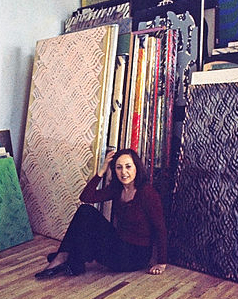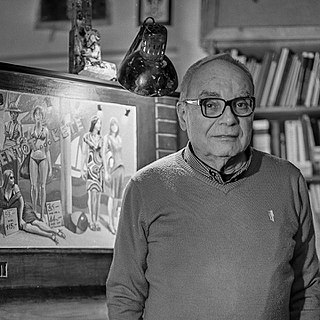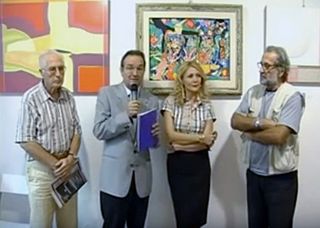Guido Marzulli | |
|---|---|
 Guido Marzulli - Self portrait - 1969 | |
| Born | Guido Marzulli July 8, 1943 Bari, Italy |
| Nationality | Italian |
| Known for | Painting |
| Movement | Realism, Figurative art |
Guido Marzulli is a figurative Italian painter .
Guido Marzulli | |
|---|---|
 Guido Marzulli - Self portrait - 1969 | |
| Born | Guido Marzulli July 8, 1943 Bari, Italy |
| Nationality | Italian |
| Known for | Painting |
| Movement | Realism, Figurative art |
Guido Marzulli is a figurative Italian painter .
Guido Marzulli was born in Bari, July 8, 1943.
His father – Michele Marzulli, who was also a poet and writer – and his mother Rosa Tosches were skilled painters. [1]
He began his artistic activity in Bari, where he spent his adolescence and attended various meetings and debates with most important scholars and Italian painters, used to be part of the literary and artistic salon established in his parent home during the 1960s.
Also in Bari he finished his university studies and completed a degree in Economics.
In 1970, he moved to Rome, where he deepened his research on both landscape and portrait. During the same period, he traveled along Europe, broadening his knowledge to the greatest artists of antiquity and European masters from the nineteenth and beginning of the 20th century.
Since 1991, he has lived in Milan and continued painting also in his summer house in Santa Severa (Rome).
Marzulli originally set his work along the path traced by the naturalist Neapolitan tradition, he revisits it through the impressionist experience, interpreting it with strength and a 20th-century mark.
In the second half of the 1970s he took a strong position against informal and conceptual art (as the Transavantgarde movement did in the late 1970s and 1980'). [2]
He rejected abstract art and focused on figurative painting, receiving awards and acknowledgements including the Gold Medal at the Biennale of Rome G.Tortelli in 1990. [3]
Marzulli knew well the concept of Modern Art, but he chose to keep his work in a more traditional form, representing daily life and the human figure as its main character. [4]
His works have a realistic basis, but also a subjective component which reflects the inner feelings of the painter.
He is considered a contemporary representative of figurative realism.
Stylistically, Guido Marzulli can be associated with Contemporary Realism.
The painstaking quality of the refinement in his paintings mean production is not high, so paintings are found only rarely on the market as a result.
Marzulli starts from the belief that the pictorial story doesn’t need intermediaries to explain the meanings, but must be easy to interpret by common people who should be able to recognize themselves into it, feel direct emotions and find out resemblances of own private memories without any difficulties. [5]
He, on the other hand, doesn’t scatter himself behind symbolism or hidden meanings, and keeps a fine balance between contemporary and an everyday sense of elapsed time, getting inspired by memories and by social reality, interpreting those, sometimes with an indirect nostalgic mind, with a straight and equable language, chromatic evocative personal sense and often adapting the mere visual aspect to his own feeling and, to his own ideal of composite armory.
He composed, with a well balanced idealism and realism at the same time, views and characteristic urban glimpses with easy reading expression and with an intimate and realistic background, together with life scenes, open markets, seascapes, intimate domestic interiors with figures and intense portraits, some of these representing his wife, the source of inspiration of many of his works. [6] [7]
His works are conserved at the Museums of Bari (Pinacoteca metropolitana di Bari) and Latina (Galleria Civica d'Arte Moderna e Contemporanea di Latina), Foggia (Museo Civico e Pinacoteca Comunale di Foggia = Civic Museum and Municipal Gallery of Foggia) and Matera (Museo Nazionale di Matera). [8]
The photographic list of many of his paintings and the biographical documentation are in leaflets dedicated to this artist in the Bio-iconographic Archive of the Supervisory Office of the Galleria Nazionale d'Arte Moderna (National Gallery of Modern and Contemporary Art) in Rome (Ministry of cultural assets). [9]


The Galleria Nazionale d'Arte Moderna e Contemporanea, also known as La Galleria Nazionale, is an art museum in Rome. It was founded in 1883 on the initiative of the then minister Guido Baccelli and is dedicated to modern and contemporary art.
Paolo Canevari is an Italian contemporary artist. He lives and works in New York City. Canevari presents highly recognizable, commonplace symbols in order to comment on such concept as religion, the urban myths of happiness or the major principles behind creation and destruction.

Carla Accardi was an Italian abstract painter associated with the Arte Informale and Arte Povera movements, and a founding member of the Italian art groups Forma (1947) and Continuità (1961).
Antonio Bueno was an Italian painter of Spanish origin, who acquired Italian citizenship in 1970. He was born in Berlin while his journalist father was posted there by the newspaper ABC of Madrid.

Joseph Pace is an Italian painter and sculptor.

Piergiorgio Colautti is a modern Italian painter and sculptor, who lived and worked in Rome. He is known for his own distinctive style, sometimes labelled "Hyperfuturism", in which figurative elements are enmeshed and submerged by symbols reflecting a cold and modern technological world.
Marina Apollonio is an Italian painter and optical artist. She lives and works in Padua.

Marino Alfonso, better known as Mafonso, is an Italian painter and sculptor

Sergio Ceccotti is an Italian painter. He lives and works in Rome.

Mauro Marrucci was an Italian artist born in Volterra, Italy on December 18, 1937, by artisans parents and he died November 15, 2014, in Grosseto. Since 1950 he is acting as the Alabaster craftsman and wood and began his artistic research, released by academic schemes, as a graphic designer and painter and makes experiences in the field of sculpture. In 1861 he won first teaching assignment in Tuscany where he continues to practice as a graphic designer, painter and designer. Since 1973, public writings of artistic teaching and non-fiction. In December 1974 on Public Education of drawing the essay "The educational dialogue through the work of art." He also collaborates with the magazine School and cities. In 1982 he moved to Milan to teach Design and Art History at the XIII High School. In 1986 he held the chair of architecture at the Art School "Pietro Aldi" in Grosseto until retirement. From 1957 to 2011 he took part in demonstrations in graphics and painting in Italy and abroad, receiving reports from the most qualified critics and several awards.
Pasquale Verrusio was an Italian painter, sculptor and engraver.

Antonello Spadafora, Italian painter of contemporary art.

Antonio Servillo, Italian painter of contemporary art.

Luigi Salvatori, Italian painter of contemporary art.

Nino Camardo, italian naïve art painter.

Claudio Detto is an Italian painter of contemporary art.
Michele Guerrisi was an Italian sculptor, painter and writer.
Elisa Montessori is an Italian painter.

Cristoforo Russo is an Italian contemporary painter.